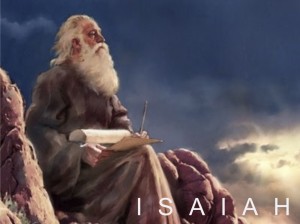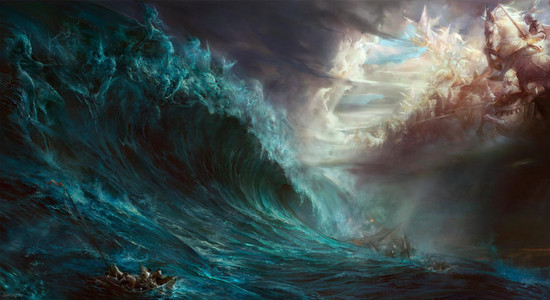One Old Testament passages which sheds light on what happened at the flood is Isaiah 54:7-9. Though not much is said in this text to explain the cause or reasons for the flood, the text does reveal God’s activity during the flood.
Lots of people believe that God was the one who sent the flood to kill all the people on earth, but Isaiah 54 suggests otherwise.
Isaiah 54 and the Flood
 In Isaiah 54, Israel is feeling as if they have been abandoned and scorned by God. God likens them to a woman who has borne no children, and is facing the shame and disgrace of being barren (Isaiah 54:1, 4).
In Isaiah 54, Israel is feeling as if they have been abandoned and scorned by God. God likens them to a woman who has borne no children, and is facing the shame and disgrace of being barren (Isaiah 54:1, 4).
God tells them to sing for joy, to forget their shame, and to remember their reproach no more (Isaiah 54:4). Why? Because God Himself is Israel’s husband (Isaiah 54:5). And since He is God the whole world, He will give more children to Israel than she ever could have had in any other way (Isaiah 54:1-3).
God does admit that his wrath came upon Israel for a while, and that for a mere moment He turned away from Israel (Isaiah 54:6-7). But God then promises that with great mercy and everlasting kindness, He will gather them, protect them, provide for them, love them, and take care of them (Isaiah 54:7-8, 11-15).
God’s wrath is not God’s anger at sin, but is rather the natural consequence of using God’s good gifts in a wrong way. God gave us the ability to love and make free choices, but when we abuse love, and use our freedom to make bad choices, we experience the natural consequences of these decisions. Future posts on the wrath of God explains this concept in more detail and looks at several key biblical texts.
Why the Flood Came Upon the Earth (Isaiah 54:16)
For now, notice something quite surprising in this text. In Isaiah 54:16, God explains why the flood came upon the earth. Using the imagery of “the blacksmith who blows the coals in the fire” God says, “I have created the spoiler to destroy” (Isaiah 54:16).
 The Hebrew word translated as “spoiler” is the Hiphil participle from shachat. It could also be translated as “the destroyer” (cf. NAS, NIV, NET). More interestingly still, the Hiphil participle of shachat is also used in Genesis 6:13 and 17 in reference to the destruction that came upon the earth. By using such imagery, God explains why the flood came upon the earth: it came because the destroyer destroys. This is the fourth principle of the Chaos Theory.
The Hebrew word translated as “spoiler” is the Hiphil participle from shachat. It could also be translated as “the destroyer” (cf. NAS, NIV, NET). More interestingly still, the Hiphil participle of shachat is also used in Genesis 6:13 and 17 in reference to the destruction that came upon the earth. By using such imagery, God explains why the flood came upon the earth: it came because the destroyer destroys. This is the fourth principle of the Chaos Theory.
But what does it mean when the text say that God created the destroyer to destroy? Is not the destroyer opposed to all that is good and Godly? Yes! God is not a destroyer, but a Creator. Nor does God “send” the destroyer to destroy. The destroyer destroys because he is a destroyer. And since everything that exists has it origin in God, it can be said that God created the destroyer. This idea is troubling to some, but note carefully how God explains this.
How the Destroyer Came to Be
Before God mentions that He created the destroyer, God says that He created the blacksmith (Isaiah 54:16a). The blacksmith blows on the coals and brings forth the instruments for his work. Though God created the blacksmith, it is the blacksmith who does his work and brings forth the tools and instruments from his forge.
While many tools that come off a blacksmith forge are used for good purposes, some blacksmiths create tools and instruments that can be used for evil. Sometimes, an instrument or tool which the blacksmith created for good could be used to cause great harm to others. Take a knife, for instance. If a blacksmith makes a knife to cut vegetables, but someone else uses it to kill humans, it is not the knife’s fault, the blacksmith’s fault for making the knife, or even God’s fault for making the blacksmith.
This is how to understand the statement by God in Isaiah 54:16b that He created the destroyer. It is not that God was out for bloody revenge, or because God wanted someone else to do His dirty work for Him. The destroyer is not God’s super-secret hit man who does what needs to be done so God can keep His hands clean.
No, Scripture is clear. When God creates, He only creates good things for good purposes. There is no evil intent in the heart of God. The destroyer was not created to be evil, or to do bad things. In fact, it might be best to realize that the destroyer was never created at all as “the destroyer.” Just as God did not create humanity sinful, but we became sinful through our rebellion, so also the destroyer became destructive, also as a result of rebellion.
Death, decay, and destruction are the natural consequence of disobeying God and going against His will. The only way that God can be said to have created the destroyer is by saying that He created a being with genuine free will, and in so doing, restricted Himself from intervening when that free being chose to depart from God’s perfect will.
God did not make or create death and destruction, but did allow for their possibility when He created life and gave freedom to His creation.
It is the same with human beings. When God created humanity with the freedom to go against His will, this freedom necessitated the possibility that history would go bad if we went against His will, which is exactly what happened in Genesis 3, and the negative consequences of this decision are felt in Genesis 4 when Cain murders his brother, in Genesis 5, where the phrase “and he died” is repeated over and over and over, and then in Genesis 6 when people become so evil that the destruction of all mankind becomes inevitable and God steps in to save and rescue Noah and his family.
This brings us back to what God says about the flood in Isaiah 54. Just as when Israel became evil and departed from God, He sought to gather them to Himself and show mercy to them (Isaiah 54:7-8), so also this is what God says He did in the flood. The flood came upon the earth, but God worked to rescue people from it, and when it was over, He promised that such a thing would never happened again (Isaiah 54:9).
In the end, Isaiah 54 shows us once again that behind the terrible death and destruction of the flood, there is a beautiful theme of God’s love, grace, and mercy as He seeks to rescue and deliver people from the storms of life. God promises that even if the mountains crumble and the hills disappear, God will lever depart, and His covenant of peace will never be removed (Isaiah 54:10).
God Does Not Forsake His People
Isaiah 54:9-10 is similar to what God said elsewhere: “I will never leave you nor forsake you” (Heb 13:5). Though Israel may leave and reject God, God will not leave or reject them. In fact, though it appears from various events in her history that He has abandoned them, it is they who abandoned Him, and though He walked with them, calling them back, pleading with them to return to His righteous ways, they walked straight into the maws of destruction.

In those catastrophic events brought upon them by the destroyer when they left the protective hand of God, it seemed to them that God was angry with them, that God had left them. But quite to the contrary, God was there all along, suffering alongside them, helping them bear up under the crushing burden of pain and loss, and waiting with them until the heavy cost of justice had been poured out by the destroyer. Then God led them forth, back into righteousness and life, restoring unto them light, liberty, freedom, and joy.
The promise of God in Isaiah 54 is that even if Israel abandons Him, He will not abandon her. Even if destruction comes, He will try to rescue as many people as He can from this destruction, and bring them back from it as quickly as possible, just as He did in the days of Noah. According to what God says in Isaiah 54 about the flood, He did not bring the waters of destruction; the destroyer brought them. Instead of bringing death and destruction upon the world in the flood, God was involved in three other activities.
God Rescues, Redeems, and Delivers
The first thing God did in the flood was call people back to Himself so that they might be delivered. He did this through the preaching of Noah.
The second thing God did was that when the flood waters came upon the earth, He sought to rescue, redeem, and deliver as many people from the flood as He would come. In the end, only eight were saved.
Finally, when the destruction was over, He sought to bring light, hope, healing, and restoration back to the earth as quickly as possible. He did this by sending the wind to push back the waters, and then by blessing Noah and his family in their efforts to be fruitful and multiply upon the face of the earth.
What then does God say about the flood through the prophet Isaiah? That although He created the mechanism by which the flood came (Isaiah 54:16b), His commitment before, during, and after the flood was to never depart from His children, even though they may try to depart from Him (Isaiah 54:8-10).
When the text says that God had forsaken his people, and hid His face from them (Isaiah 54:7-8), this does not mean that He had abandoned them, but that the people had strayed so far from God that when destruction came at the hand of the destroyer and as a consequence for their sin, it seemed to the people that God was absent, that He was punishing them, or that He was no longer involved in their lives.
If there is one thing we learn from Isaiah 54 about the flood, it is that although it appears as if God sent the flood as punishment, it actually came as a result of humanities departure from the protective hand of God, and because the destroyer had set out to bring destruction upon the people of the earth as the just consequence for their great sin.
 How can a God who says "Love your enemies" (Matthew 5:44) be the same God who instructs His people in the Old Testament to kill their enemies?
How can a God who says "Love your enemies" (Matthew 5:44) be the same God who instructs His people in the Old Testament to kill their enemies?
These are the sorts of questions we discuss and (try to) answer in my online discipleship group. Members of the group can also take ALL of my online courses (Valued at over $1000) at no charge. Learn more here: Join the RedeemingGod.com Discipleship Group I can't wait to hear what you have to say, and how we can help you better understand God and learn to live like Him in this world!




Don’t blame God. We continue to plot our own destruction.
Yes, and unless things change, destruction is coming.
Beautiful post. Enlightening and well written. It’s so important to have the correct perspective, as the world is constantly trying to twist the meaning of the Bible so that people don’t recognize, or have a distorted understanding of, God’s love and mercy and grace. We must be diligent in seeking wisdom and sharing it with those who have been led astray from understanding. Thank you for your insights!
Thanks, Michael. Diligence is definitely needed, and an emphasis on God’s love, mercy, and grace.
This is beautiful, but it is absolutely a misrepresenting the actual Bible account. In any version or translation the story, while similar to your telling, is actually much different.
First, God does not that he allowed that man could create materials and in so doing through free will man would create implements of war. Or even that implements of war have no place or are abhorrent in his creation. In all translations, God instructs that he created both the tools of the field and of war. He did not create one and a corrupted man the other. He intended both, and he made the men who would be of a mind to use both for their expected purposes. Tools and men that would till the fields and gather the harvest and weapons to be used as such. God is not ambiguous and does not pass blame to mankind for this. (Outside of Eve and the Apple; but even in this instance God does not say, “but for original sin I would not have caused these to be”).
God intended the plow and the sword, and the men for each are fully his creations. He then proceeds to teach us that, as both the sword and the men who wield them exist and were created for their purposes by him; he can and will exert his will over his creations ensuring that his people will not fall to these creations. He will exert his will no harm will befall his chosen.
Remember, God doesn’t set free will and then abstain from involvement in the old testament. God can and does make pact with his people to take an active role in their defense and prosperity. Likewise in his displeasure he destroys and scatters his people and his prophets many times, in both global and personal reckonings, and amongst nations and kings of the ancient era.
And throughout that era God is clear when referring to that which is his and that which is mans doing. Retelling very clear teaching of God as somehow all due to original sin is presumptuous. God commanded that fruit go uneaten; and the consummation of such kicked off all that we are today. At no point does he teach us that the fall shouldn’t have happened or even couldn’t have happened. By God’s own teaching, his plan required that his creations, having free will, yet no appreciation of hardship or adversary, must, like all children do as they move from innocence to adulthood, think that they know better than there parents and elders and break seemingly arbitrary rules. And is the case with children it is only in hindsight, and after experiencing the repercussions of our actions that any appreciation for the why of our parents rules seem in hindsight obvious and intended to spare us from learning lessons the hard way.
The flood was not some random event for which God saved Noah in a Hail-Mary act of compassion. God set forth to remove all of humanity from the face of creation, and before doing so, gave a profound and unimaginable task of faith to Noah. Noah, completing that task would save his immediate family and the many species of life on earth.
Unlike God’s work and teachings in this later era, where compassion and kindness for one’s fellow man are the whole of the law (by word, but more importantly, in example after example, that when we think we know God’s law and set forth to make prey on our fellows using it as our succor, that indeed, no matter the crime, the answer is to treat each other with dignity, humility and love). For the disciples just _knew_ that a prostitute was fair game under Gods scriptures; and instead of just a trite correction, Jesus showed them how to truly apply God’s law. He didn’t deride her, admonish her, quote her Gods scripture, his punishments, her unworthiness for either kingdom, instruct her in the saving of her sol, nor even expect that she must change to be welcome in his kingdom. He washed her feet.
The new policy. Instead of trying to get your wayward children to behave with detailed instructions, that may or may not be relevant outside the century in which they were spoken…. Instead of punishments, the whip, the rod, and threats of brutal accounting; a new direction in parenting. Love. Kindness. A new set of principles available to anyone through the very act of their practice. No particular dogma or ceremony is required; you don’t even have to root for him by name, practice alone is the gateway. It is through love that one moves forward. And no one is ever truly left behind.